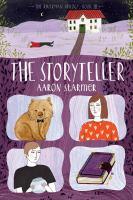
Now, as I read it all over again, I wonder . . .
They call that literary analysis, Stella, and I'm not particularly good at it. My job is to write. Your job is to figure out the deep stuff.
And there is deep stuff going on here, isn't there? For the love of Luna, I hope so.
Oh, there is. There definitely is deep stuff going on here. You know because you feel it. Sometimes, though, feelings are hard to pinpoint. Hard to analyze. That's how this is. It doesn't necessarily need the literary analysis because it creates a depth of feeling not dependent on explicit definition.
That's been the nature of the entire trilogy. Each book is a surprise, a departure--a deviation--from what has come before. A new layer that revisits the earlier stories even as it adds entirely new ones. I find I must reflect that layering in order to describe the experience by revisiting what I wrote about the two previous books in my review of The Whisper:
This series. Wow. So different and unexpected than most everything else out there. And this second book that is so unexpectedly different than the first, that reframes and deepens and changes The Riverman as it expands that book's universe exponentially.
In my review of The Riverman I wrote, This is a mystery book. But is it a fantasy book? That's the mystery. That's because Alistair was an observer in the first book, slowly drawn into caring about a strange world that might have been a fantasy horror and might have been a psychological thriller--with drastic consequences either way.
Now Alistair knows which it is, because he has gone from observer to participant, from watcher to doer. He has entered the fantasy horror. His role has changed, his perspective has changed, his setting has changed. . . .
With this third book we have come full circle, back to the real world setting of The Riverman, a small town in New York, with normal people dealing with normal situations. Except the circle has spiraled to a new level, because it is no longer Alistair's story. Though this book picks up chronologically right after the others, he is now a side character in the story of his older sister, who narrates it in her diary.
Keri is maybe spurred to begin writing because of unusual and dramatic events involving her brother, but after recording her initial reactions to them she writes about herself. About her friends and her efforts to negotiate the changing social landscape of eighth grade, about the changes in her family as its members struggle to deal with the repercussions of Alistair's actions, and about her efforts to reconcile reality to the strange, fantastical explanations Alistair confides to her.
Keri also fills her diary--interspersed with her journalistic entries--with fantastical stories of her own. Odd, unsettling, possibly allegorical tales she feels compelled to write as a way of expressing her feelings at levels deeper than analysis allows. They begin with an image of a phosphorescent wombat and go through everything from a trapped princess to baby birds dying in exponentially increasing numbers, anthropomorphized clouds and knock-knock jokes and guns, a girl made of candy canes and a social network made of pasta tubes, and the expanded ramifications of opposite day and an inability to disbelieve. They are as compelling and moving as they are incomprehensible and baffling; confounding and insightful at the same time.
Just like the rest of the book. Just like the rest of the series. These books--the entire saga and all the little tales contained within--are about learning to live through the reality that life offers far more questions than answers. That some things, even as we feel them and express them and react to them, we'll just never understand. That some things just are, and always will be, mysteries. That we are, even to ourselves, even as we embody our emotions and enjoy engaging in pursuit of self-understanding, largely unknowable mysteries.
How this book accomplishes that is equal parts unpredictable, exceptional, unexpected, and astounding. And it is entirely wonderful.
This story is about . . . well, it's about how God is a wombat, because why can't God be a wombat? . . .
When I first came up with the story, that was the first thing I thought about. A wombat who becomes God. A wombat who destroys and resurrects our universe, but who in the end only wants to feel the pitter-patter of rain on her head. A wombat who loves and makes mistakes like any of us. A wombat who glows, but doesn't know why. A perfectly fine wombat.
